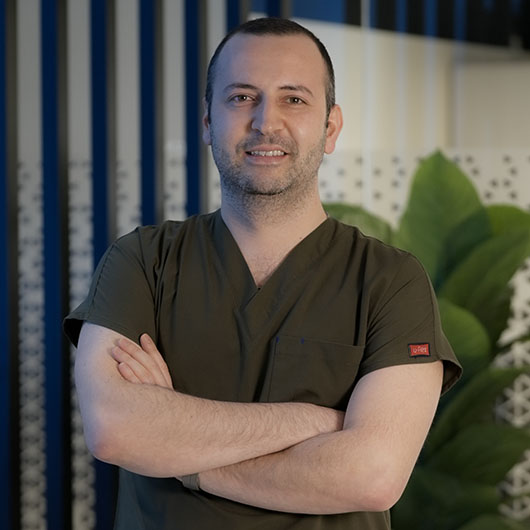Root Canal Treatment
Root canal treatment is a procedure performed to save a decayed or infected tooth. It is preferred when a tooth decay has deepened, become inflamed, or is painful. During the treatment, the soft tissues and nerves inside the tooth's root canal are removed, the inside of the tooth is cleaned, and the space is filled.
Root Canal Treatment
- What is Root Canal Treatment?
- When is Root Canal Treatment Used?
- How is Root Canal Treatment Performed?
What is Root Canal Treatment?
Root canal treatment is a procedure performed to save a decayed or infected tooth. It is preferred when a tooth decay is deep, inflamed, painful, or causing discomfort during endodontic treatment. During the treatment, the soft tissues and nerves inside the root canal of the tooth are removed, the inside of the tooth is cleaned, and the space is filled.
The tooth nerve is a sensory nerve used only for temperature sensations, and its removal is not essential for the health and function of the tooth. Root canal treatment is usually completed within 1 hour, and the patient typically does not feel pain. Advances in devices and systems have shortened the duration of root canal treatment and made the procedure easier.
Root canal treatment is performed when the nerve or pulp inside a tooth has been damaged or infected due to deep cavities, cracks, facial trauma, or other conditions. These situations can lead to bacterial growth in the root canal and the development of an infection. Infection can manifest as a dental abscess and cause pain. Root canal treatment is essential to address the abscess; otherwise, it can lead to complications such as swelling, bone loss, and drainage issues.
Prompt treatment of a tooth with an abscess helps the individual get rid of pain that affects their quality of life. Dental pain can worsen during nighttime hours, affecting sleep quality and daily activities. Therefore, timely root canal treatment is crucial.
When is Root Canal Treatment Used?
- Pulpal Inflammation: The pulp (inner tissues) of a tooth can become inflamed due to reasons such as tooth decay or trauma. Inflamed pulp causes severe pain, sensitivity, or swelling in the tooth. Root canal treatment aims to remove the inflamed pulp and control the infection to preserve the tooth's health.
- Pulpal Necrosis: The pulp tissue inside a tooth can die. This typically occurs due to advanced decay or trauma. Pulpal necrosis can manifest with severe pain, changes in tooth color, abscess, and other symptoms. Root canal treatment removes the dead pulp and controls the infection to preserve the tooth. Dental Trauma: Teeth can be subjected to trauma during accidents, impacts, or sports activities. Dental trauma can lead to inflammation or damage to the pulp. Root canal treatment aims to preserve the tooth's health by treating the pulp affected by trauma.
- Tooth Cracks or Fractures: Cracks or fractures in teeth can damage the pulp and increase the risk of infection. Root canal treatment is performed to treat the pulp in cracked or fractured teeth and preserve their health.
- Recurrent Cavities: In some cases, cavities can develop beneath previously placed fillings or restorations. When decay reaches the pulp, it can lead to infection and inflammation. Root canal treatment cleans out the decay and treats the pulp, preserving the tooth.
- Advanced Tooth Wear: Tooth wear, caused by excessive abrasion or erosion, can damage the pulp. In such cases, root canal treatment may be necessary.
How is Root Canal Treatment Performed?
The process of root canal treatment involves the following steps:
- Diagnosis: Your dentist evaluates symptoms such as pain, sensitivity, tooth discoloration, or gum swelling to diagnose pulp issues. X-ray images are often used to examine the situation in more detail.
- Anesthesia: During root canal treatment, your dentist will apply local anesthesia to numb the treatment area, minimizing pain or discomfort.
- Access: The dentist opens the protective tooth structure on the tooth being treated by making a small hole.
- Pulp Removal: Through the access hole, the dentist reaches the inside of the tooth and removes the pulp, which is either affected or infected. Damaged or infected tissue is cleaned out. The entrances to the root canals are also widened.
- Canal Cleaning and Shaping: Root canals are cleaned and shaped using special files. The goal is to completely remove bacteria, infection, and other residues from the root canals.
- Canal Filling: The cleaned and shaped root canals are filled with a special filling material called gutta-percha. Gutta-percha is placed into the canal and seals it off, preventing re-entry of bacteria and infection.
- Restoration: After completing the root canal treatment, the access hole on the tooth is sealed, and an appropriate filling or protective crown (cap) is applied. This step helps the tooth regain its strength and durability.
Root canal treatment may involve one or several sessions, depending on the situation and the condition of the tooth. The treatment process is generally painless because anesthesia is applied, and the removal of the pulp eliminates the influence of nerves inside the tooth.
Doctors
List of doctors under the HOP of the corporation













